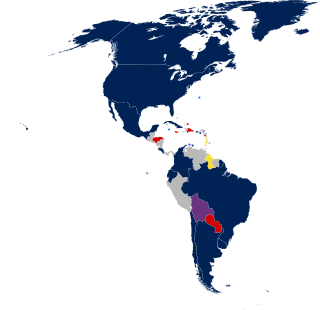This article needs additional citations for verification .(June 2019) |
| |||||
| Decades: | |||||
|---|---|---|---|---|---|
| See also: | |||||
This article needs additional citations for verification .(June 2019) |
| |||||
| Decades: | |||||
|---|---|---|---|---|---|
| See also: | |||||
Same-sex marriage, also known as gay marriage, is the marriage of two people of the same legal sex. As of 2023, marriage between same-sex couples is legally performed and recognized in 34 countries that have a total population of about 1.35 billion people, with the most recent being Andorra. It will become legal in a 35th country, Estonia, on 1 January 2024.

The availability of legally recognized same-sex marriage in the United States expanded from one state (Massachusetts) in 2004 to all fifty states in 2015 through various court rulings, state legislation, and direct popular votes. States each have separate marriage laws, which must adhere to rulings by the Supreme Court of the United States that recognize marriage as a fundamental right guaranteed by both the Due Process Clause and the Equal Protection Clause of the Fourteenth Amendment to the United States Constitution, as first established in the 1967 landmark civil rights case of Loving v. Virginia.
Same-sex adoption is the adoption of children by same-sex couples. It may take the form of a joint adoption by the couple, or of the adoption by one partner of the other's biological child.

Lesbian, gay, bisexual, and transgender (LGBT) rights in Ecuador have evolved significantly in the past decades. Both male and female same-sex sexual activity are legal in Ecuador and same-sex couples can enter into civil unions and same-sex marriages.
This article contains a timeline of significant events regarding same-sex marriage and legal recognition of same-sex couples worldwide. It begins with the history of same-sex unions during ancient times, which consisted of unions ranging from informal and temporary relationships to highly ritualized unions, and continues to modern-day state-recognized same-sex marriage. Events concerning same-sex marriages becoming legal in a country or in a country's state are listed in bold.

Lesbian, gay, bisexual and transgender (LGBT) rights in the United States rank among the highest in the world, with public opinion and jurisprudence changing significantly since the late 1980s. However, LGBT people and their rights have continued to face attacks from far-right groups and conservative politicians, particularly on a state level.
The legal status of same-sex marriage has changed in recent years in numerous jurisdictions around the world. The current trends and consensus of political authorities and religions throughout the world are summarized in this article.
Several countries in the Americas grant legal recognition to same-sex unions, with almost 85 percent of people in both North America and South America living in jurisdictions providing marriage rights to same-sex couples.

Laws governing lesbian, gay, bisexual, and transgender (LGBT) rights are complex and diverse in the Americas, and acceptance of LGBT persons varies widely.
Same-sex marriage has been legal in Ecuador since 8 July 2019 in accordance with a Constitutional Court ruling issued on 12 June 2019 that the ban on same-sex marriage was unconstitutional under the Constitution of Ecuador. The ruling took effect upon publication in the government gazette on 8 July. Ecuador became the fifth country in South America to allow same-sex couples to marry, after Argentina, Brazil, Uruguay and Colombia, but adoption by married couples remains restricted to opposite-sex couples. The country has also recognized same-sex civil unions since 2008.
Same-sex marriage has been legal in Cuba since 27 September 2022, after a majority of voters approved the legalization of same-sex marriage at a referendum two days prior. The Constitution of Cuba prohibited same-sex marriage until 2019, and in May 2019 the government announced plans to legalize same-sex marriage. A draft family code containing provisions allowing same-sex couples to marry and adopt was approved by the National Assembly of People's Power on 21 December 2021. The text was under public consultation until 6 June 2022, and was approved by the Assembly on 22 July 2022. The measure was approved by two-thirds of voters in a referendum held on 25 September 2022. President Miguel Díaz-Canel signed the new family code into law on 26 September, and it took effect upon publication in the Official Gazette the following day.
This is a list of notable events in the history of LGBT rights that took place in the year 2008.

The following outline is provided as an overview of and topical guide to Ecuador:

The Constitutional Court of Ecuador, previously the Constitutional Tribunal of Ecuador is the constitutional court of Ecuador.

The Constitution of Ecuador is the supreme law of Ecuador. The current constitution has been in place since 2008. It is the country's 20th constitution.

The Respect for Marriage Act is a landmark United States federal law passed by the 117th United States Congress and signed into law by President Joe Biden. It repeals the Defense of Marriage Act (DOMA), requires the U.S. federal government and all U.S. states and territories to recognize the validity of same-sex and interracial civil marriages in the United States, and protects religious liberty. Its first version in 2009 was supported by former Republican U.S. Representative Bob Barr, the original sponsor of DOMA, and former President Bill Clinton, who signed DOMA in 1996. Iterations of the proposal were put forth in the 111th, 112th, 113th, 114th, and 117th Congresses.
This is a list of notable events in the history of LGBT rights that took place in the year 2018.
This is a list of notable events in the history of LGBT rights that took place in the year 2019.
This is a list of notable events in LGBT rights that took place in the 2010s.

Rosana Alvarado Carrión is an Ecuadorian feminist politician for the Alianza PAÍS party. In 2017 she was the first vice President of Ecuador's National Assembly. From 2017 to 2021 she was the Minister of Justice. She is in favour of same-sex marriage and the liberalisation of the Ecuador's laws against abortion.